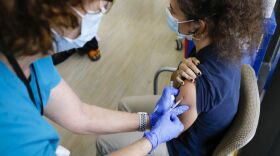
Joe Neel
Joe Neel is NPR's deputy senior supervising editor and a correspondent on the Science Desk.
As a leader of NPR's award-winning health and science team, Neel directs coverage of breaking news in health and science, ranging from disease outbreaks and advances in medical research to debates over health reform and public health.
Joe also plays a key role in overseeing the Science Desk's award-winning enterprise reporting. Among his current projects and responsibilities, Neel supervises the Monday "Your Health" segment on Morning Edition. He also directs several ongoing editorial partnerships. One, a partnership with Kaiser Health News and public radio member stations, focuses on health care in the United States. Another is a polling project on health issues with the Harvard T. H. Chan School of Public Health and the Robert Wood Johnson Foundation.
Neel has played a key role in expanding the network's coverage of global health and development issues. He is currently focused on domestic health issues, including cutting-edge biomedical research and developments in the health industry, such as the Affordable Care Act.
In 2008, he launched NPR's "Your Health" podcast and helped launch and grow "Shots," NPR's health blog, in 2010.
In addition to his responsibilities at NPR's Science Desk, Neel also regularly serves as newsroom manager, overseeing the network's overall news coverage.
During his tenure as editor, NPR's health reporters and correspondents have won numerous awards, including the George Foster Peabody Award, the National Academy of Sciences Communication Award, the Sigma Delta Chi Award from the Society for Professional Journalists, the Everett McKinley Dirksen Award for Distinguished Reporting on Congress, the American Association for the Advancement of Science's Journalism Prize, and the Association of Health Care Journalism award. Neel was awarded the prestigious Kaiser Family Foundation Media Fellowship in 2007.
Neel started filing stories about medicine and health as a freelancer for NPR in 1994 and joined the staff two years later.
He earned bachelor degrees from Washington University in St. Louis in both biology and German literature and language. He also studied biology at the Universitaet Tuebingen in Germany.
-
The CDC is officially recommending a third dose of the Pfizer or Moderna vaccine for people with weakened immune systems. It follows the FDA authorization a day earlier.
-
The CDC information dated Thursday gives new details on this variant of the coronavirus and says the agency should "acknowledge that the war has changed." It was first reported by The Washington Post.
-
The cases have been seen mostly in teens and young adults between 12 and 39 years old. No deaths have been associated with this side effect of the Pfizer and Moderna vaccines.
-
Masks are optional for vaccinated kids, and other recommended restrictions have been softened, making for a more relaxed camping experience for children this summer.
-
Health officials once advised going into quarantine and being tested for the coronavirus if you were near an infected person for 15 minutes. Now the rule is a total of 15 minutes in a 24-hour period.
-
The Trump administration has a plan to end the spread of HIV in the U.S. in 10 years. HIV/AIDS advocates say it's feasible but that the administration's actions on health run counter to the goal.
-
James P. Allison and Tasuku Honjo were cited for their work in harnessing the immune system to arrest the development of cancer.
-
People are relatively satisfied with the health care they receive, the new poll finds. But low-income Americans are more likely to say the quality of health care they get is only fair to poor.
-
A U.S. expert says there is no evidence that stem-cell therapy being offered in China will work in one of the most common causes of childhood blindness, optic nerve hypoplasia.
-
The Centers for Disease Control and Prevention wants adults to remember that vaccines aren't just for kids. Whooping cough, shingles, tetanus, and several other illnesses are still big problems in the U.S., mostly because adults aren't getting the shots they need.








